Sleep apnea is a prevalent breathing condition affecting adults and children, resulting in interrupted breathing during sleep. Though commonly associated with snoring and daytime fatigue, it may also have devastating consequences for your child’s dental health.
Sleep apnea can result in many dental issues that threaten your child’s oral health and development, from misaligning their teeth to delayed tooth eruption.
Sleep Apnea and Oral Health
Let us examine how sleep apnea can impede children’s dental health, the role dentists play in diagnosing and treating it, and why regular dental check-ups are crucial to maintaining good oral health among kids.
Impact of Sleep Apnea on Children’s Dental Health
- Malocclusion: Sleep apnea can lead to malocclusion or misalignment of teeth. When children experience sleep apnea, breathing becomes impaired, and they may clench or grind their teeth during sleep – this causes changes in how the teeth fit together, creating malocclusion that may result in difficulty biting and chewing, speech issues, headaches, and jaw pain.
- Delayed Tooth Eruption: Disruptions to sleep breathing can also result in delayed tooth eruption. When breathing patterns become disturbed during sleep, their bodies produce less growth hormone necessary for developing teeth and bones, delaying tooth eruption. This could severely affect the child’s bite and overall dental health issues.
- Dry Mouth and Gum Disease: Sleep apnea can also lead to gum disease. When a child has sleep apnea, their breathing is disrupted, and they may breathe through their mouth instead of their nose. Mouth breathing can cause dry mouth, which reduces the amount of saliva in the mouth. Saliva is essential for keeping the mouth clean and healthy; bacteria can thrive and cause gum disease without enough.
- Tooth Grinding: Children suffering from sleep apnea often grind their teeth at night – known as bruxism. Grinding causes wear and tear damage, possibly leading to sensitive teeth or loss.
Sleep apnea in children must be identified early. Signs include snoring, gasping or choking during sleep, restlessness, and daytime fatigue. If your child has sleep apnea, you must speak to a dentist or pediatrician immediately so they can refer them for further evaluation by a sleep specialist. You can follow this link to know more about sleep apnea and its manifestations.
Role of Dentists in Sleep Apnea
- Dentists play an invaluable role in diagnosing and treating sleep apnea in children.
- Regular dental check-ups allow your dentist to check for signs of malocclusion, delayed tooth eruption, or any other dental conditions that could indicate sleep apnea. If you’re dentist suggest a root canal therapy in Ocean, NJ, you can also avail of it to help your child’s condition.
- Suppose your child has been diagnosed with sleep apnea. In that case, their dentist can work with their physician and a sleep specialist to develop an effective treatment plan, which may involve continuous positive airway pressure (CPAP) machines or oral appliances designed to keep airways open while sleeping.
Importance of Regular Dental Check-Ups
- Regular dental check-ups for children are crucial to promote good oral health.
- Dental examinations can prevent cavities, gum disease, and other dental issues from developing.
- Your dentist can advise you on proper brushing and flossing practices.
- Your dentist may recommend sealants or fluoride treatments to protect your child’s teeth against decay.
Conclusion
Sleep apnea can severely impact your child’s dental health, including malocclusion, delayed tooth eruption, dry mouth, and tooth grinding. Parents must know its signs in children and work with their dentist or pediatrician if this is likely.
Early treatment of sleep apnea in children will help avoid long-term issues as well as promote overall good health and development; be sure to schedule regular dental check-ups in case any issues come up early on.



